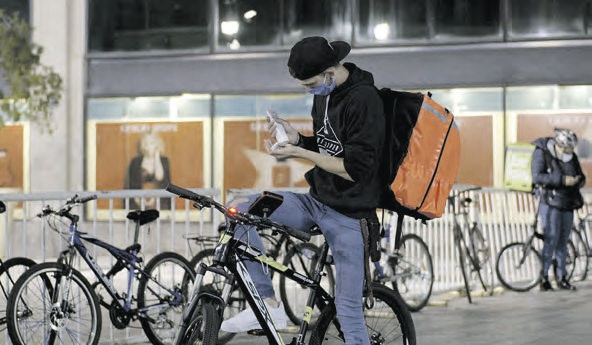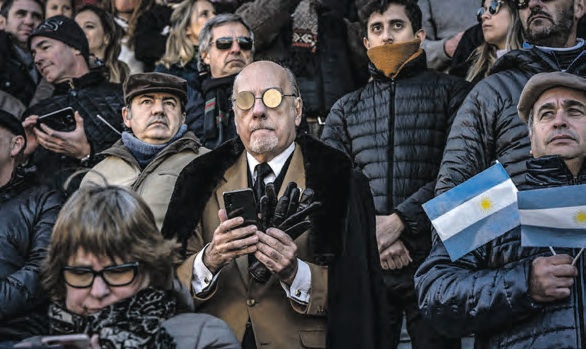Three of Argentina’s foremost auteurs - Rojo’s Benjamin Naishtat, The Third Side of the River’s Celina Murga, and Two Shots Fired’s Martin Rejtman - will present new movie projects at the 9th Europe-Latin America Co-Production Forum, the industry centerpiece at this year’s San Sebastian Film Festival.
They will be joined by up-and-coming directors such as The Heiresses’ Marcelo Martinessi, The Sharks’ Lucía Garibaldi and The Future Perfect’s Nele Wohlatz in a lineup that is long on strong and fairly established Argentine talent, has great on-the-rise directors from the rest of Latin America, plus a clutch of new Colombian directors, and presses the urgent social-issue concerns that have come to characterize Latin American cinema.
Officially unspooling over Sept.19-21, pre-recorded pitchesof projects were made available to festival industry guests from earlier in the week. Now negotiations can begin on titles as Latin America, with is state support system decimated in Argentina and Brazil and threatened in other countries, looks once again to Europe to step up to the plate with sizable co-production investment.
Catapulted to fame when Martin Scorsese executive produced The Third Side of the River, Murga will present The Smell of Freshly Cut Grass, a high-concept gender drama starring Paulina’s Dolores Fonzi and
co-written with partner and fellow film director Juan Villegas (Las Vegas).
Produced by Uruguay’s Montelona and Cimarrón, Garibaldi’s The Last Queen, her follow-up to Sundance laureate The Sharks, weighs in as near-future geo-political allegory. It turns on Elisa, the last young woman in a city whose youth, when they come of age, are forced to migrate to the North, a kind of promised land where “history is being made.” Elisa, however, refrains.
Adapting Robert Arlt’s 1929 The Seven Madmen and 1931 sequel The Flamethrowers, novels written during the ride of fascism, to a modern Buenos Aires setting, contemporary noir thriller Pobres Pibes is an “unnerving, fast-paced, urban tale” built on “the basis of a fascination for irredeemable losers and their preferred emotion, the one that governs our time: Resent,” Naishtat said.
An anticipated crime thriller set in Paraguay capital Asunción in 1959, Marcelo Martinessi’s ¿Who Killed Narciso? a slice of historic noir, hits San Sebastián backed by three companies behind his 2018 triple Berlinale winner The Heiresses: Luxbox, Pandora and La Fábrica Nocturna Prods.
On the eve of San Sebastián, Pandora also boarded as a co-producer Rejtman’s Riders (El Repartidor está el camino), a doc feature, about delivery bike riders in Buenos Aires, largely immigrants from Venezuela, working for Internet app services, whose flowering during COVID-19.
Venezuela’s Jorge Thielen Armand will present La Cercania, the story of a woman’s flight from Venezuela to France and yearning to return. It marks the third feature from Thielen Armand, who impressed with his second, La Fortaleza, which played in this year’s Rotterdam Competition.
Set up at Argentina’s Murillo Cine, American Night is directed by Nele Wohlatz, who won best first feature at the Locarno Festival for The Future Perfect, which Variety welcomed as a “charming, humorous debut.” American Night turns on the sometimes fractious dynamics between movie animal actors and their wranglers.
Argentina-born but Mexico-based, Paula Markovitch (The Prize) will present Angeles, an off-beat friendship drama already boasting production partners in Mexico (Markovitch’s own Altamira and Avanti), Argentina (Isla Bonita) and France (So-Cle).
Among a trio of titles from young Colombian directors, neo-noir documentary Anhell69 is Colombian Theo Montoya’s first feature, after his short film Son of Sodom was chosen for the Cannes 2020 Official Selection. A portrait of Colombian youth, grappling with suicide, drug overdoses and a “no future” mindset, Anhell69 won this year’s Tribeca All Access fund and co-production from IBF Europe.
Camila Beltrán will pitch her feature debut, coming-of-age The Day of My Beast, supported by Proimágenes Colombia, after her short film Pacífico oscuro was selected by Locarno 2020. Set in Bogotá in 1999, it turns on Milagros, a 13-year-old girl who hears rumors that the Antichrist will arrive on earth during a solar eclipse.
Produced by director Franco Lolli (Litigante, Gente de bien), a third Colombian project, El otro hijo, about a teen’s reaction to his brother’s sudden death, marks the feature debut by Juan Sebastián Quebrada, a Medellín-born director. His first short film, La Casa del árbol, co-produced by Colombia’s Evidencia and Why Not Productions in France, initiated in Toronto 2017 a fruitful international festival career.
Of other films, Hungary’s Gyorgy Palfi, director of the memorably grotesque Taxidermia, and Karlovy Vary best director winner Free Fall, will introduce Hen, a Mexico-set rural crime drama seen from the POV of a hen.
Recipient of the Arte Kino International Prize at Rotterdam’s Cinemart project market last year, Argentine Mateo Bendesky’s The Fever explores the warped psychological consequences of exorcism. Costa Rica’s Alexandra Latishev will introduce the domestic violence themed Delirium.
San Sebastián’s Co-Production Forum has also selected La eterna adolescente, a dysfunctional family portrait marking the first fiction feature from Mexican filmmaker Eduardo Esquivel, and backed by Mexico’s state entity Fonca; and married couple relationship drama, Tres, the sophomore feature of Argentine art director and director Diego Schipani (Bernarda es la patria).
Memorias de un cuerpo que arde, a creative documentary project by Rounding up the Forum are Costa Rica’s Antonella Sudasassi (El despertar de las hormigas), which explores the sexual life of three older women, and the intriguing The Anatomy of the Horse, a tale of circular time and colonization set in the remote Peruvian Andes in 1781 and the present.
John Hopewell, Emiliano De Pablos






